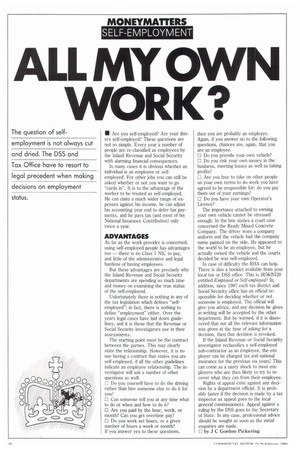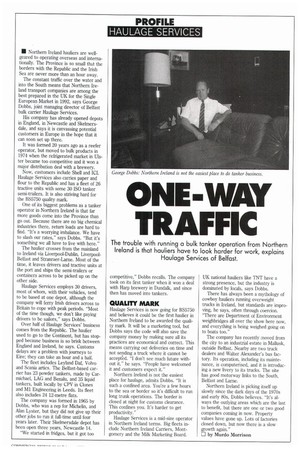ALL MY OWN WORK?
Page 42

Page 43

If you've noticed an error in this article please click here to report it so we can fix it.
• Are you self-employed? Are your drivers self-employed? These questions are not so simple. Every year a number of people are re-classified as employees by the Inland Revenue and Social Security with alarming financial consequences.
In many cases it is obvious whether an individual is an employee or selfemployed. For other jobs you can still be asked whether or not you want to go "cards in". It is to the advantage of the worker to be treated as self-employed. He can claim a much wider range of expenses against his income, he can adjust his accounting year end to defer tax payments, and he pays tax (and most of his National Insurance Contribution) only twice a year.
ADVANTAGES
As far as the work provider is concerned, using self-employed people has advantages too — there is no Class 1 N1C to pay, and little of the administrative and legal burdens of having employees.
But these advantages are precisely why the Inland Revenue and Social Security departments are spending so much time and money on examining the true status of the self-employed.
Unfortunately there is nothing in any of the tax legislation which defines "selfemployed"; in fact, there is nothing to define "employment" either. Over the years legal cases have laid down guidelines, and it is these that the Revenue or Social Security investigators use in their assessments.
The starting point must be the contract between the parties. This may clearly state the relationship, However, it is no use having a contract that states you are self-employed, if all the other guidelines indicate an employee relationship. The investigator will ask a number of other questions as well: O Do you yourself have to do the driving rather than hire someone else to do it for you?
O Can someone tell you at any time what to do or when and how to do it? 1:1 Are you paid by the hour, week, or month? Can you get overtime pay? El Do you work set hours, or a given number of hours a week or month? i If you answer yes to these questions, then you are probably an employee. Again, if you answer no to the following questions, chances are, again, that you are an employee.
O Do you provide your own vehicle?
O Do you risk your own money in the business, meeting losses as well as taking profits?
O Are you free to take on other people on your own terms to do work you have agreed to be responsible for; do you pay them out of your earnings? O Do you have your own Operator's Licence?
The importance attached to owning your own vehicle cannot be stressed enough. In the late sixties a court case concerned the Ready Mixed Concrete Company. The driver wore a company uniform and the vehicle had the company name painted on the side. He appeared to the world to be an employee, but he actually owned the vehicle and the courts decided he was self-employed.
In case of difficulty the RHA can help. There is also a booklet available from your local tax or DSS office_ This is IR56/N139 entitled Employed or Self-employed? In, addition, since 1987 each tax district and Social Security office has an official responsible for deciding whether or not someone is employed. The official will give you advice, and any decision he gives in writing will be accepted by the other department. But be warned, if it is discovered that not all the relevant information was given at the time of asking for a decision, then that decision is revoked.
If the Inland Revenue or Social Security investigator reclassifies a self-employed sub-contractor as an employee, the employer can be charged tax and national insurance for the previous six years! This can come as a nasty shock to most employers who are then likely to try to recover what they can from their employee.
Rights of appeal exist against any decision by a department official. It is probably faster if the decision is made by a tax inspector as appeal goes to the local general commissioners. Appeal against a ruling by the DSS goes to the Secretary of State. In any case, professional advice should be sought as soon as the initial enquiries are made.
O by J C Gordon Pickering El Northern Ireland hauliers are wellgeared to operating overseas and internationally. The Province is so small that the borders with the Republic and the Irish Sea are never more than an hour away.
The constant traffic over the water and into the South means that Northern Ireland transport companies are among the best prepared in the UK for the Single European Market in 1992, says George Dobbs, joint managing director of Belfast bulk carrier Haulage Services.
His company has already opened depots in England, in Newcastle and Skelmersdale, and says it is canvassing potential customers in Europe in the hope that it can soon set up there.
It was formed 20 years ago as a reefer operator, but moved to bulk products in 1974 when the refrigerated market in Ulster became too competitive and it won a major distribution deal with a brewery.
Now, customers include Shell and ICI. Haulage Services also carries paper and flour to the Republic and has a fleet of 26 tractive units with some 30 ISO tanker semi-trailers. It is also striving hard for the BS5750 quality mark.
One of its biggest problems as a tanker operator in Northern Ireland is that far more goods come into the Province than go out. Because there are no big chemical industries there, return loads are hard to find. "It's a worrying imbalance. We have to slash our rates," says Dobbs. "But it's something we all have to live with here."
The haulier crosses from the mainland to Ireland via Liverpool-Dublin, LiverpoolBelfast and Stranraer-Larne. Most of the time, it leaves drivers and tractive units at the port and ships the semi-trailers or containers across to be picked up on the other side.
Haulage Services employs 30 drivers, most of whom, with their vehicles, tend to be based at one depot, although the company will ferry Irish drivers across to Britain to cope with peak periods. "Most of the time though, we don't like paying drivers to be sailors," says Dobbs.
Over half of Haulage Services' business comes from the Republic. The haulier used to go to the Continent, but has stopped because business is so brisk between England and Ireland, he says. Customs delays are a problem with journeys to Eire; they can take an hour and a half.
The fleet includes Leyland Daf, Volvo and Scania artics. The Belfast-based carrier has 23 powder tankers, made by Carmichael, LAG and Benalu, and 35 liquid tankers, built locally by CPV in Clones and M1 Engineering in Leeds. Its fleet also includes 24 12-metre flats.
The company was formed in 1965 by Dobbs, who was a rep for Michelin, and Alan Lyster, but they did not give up their other jobs to run it full-time until four years later. Their Skelmersdale depot has been open three years, Newcastle 14.
"We started in fridges, but it got too
















































































































































































